Green
information for learners - peep progression pathway
Thank you for your interest in participating in the Peep Progression Pathway as a parent or carer. Here you will find information to help you decide if it is for you (leaflet and Sway below), and then to get going (learner handbook, registration form and procedures). Your local Peep Practitioner will be your first point of contact, but do also feel free to contact us: pathway@peeple.org.uk.
> Peep Progression Pathway leaflet for parents and carers - PDF to download or Sway to read on screen
Feature box colour:
Side Quote Color:
information for organisations - delivering the peep progression pathway
Peep Progression Pathway qualification units for parents are delivered and assessed by practitioners who have completed Peep Learning Together Programme (LTP) Training and Peep Progression Pathway Training, and are part of a local Delivery Centre (see below). Units are awarded by SCQF and are credit rated by SQA. Full guidance and procedures are provided in the training.
Join a free Pathway Info session for practitioners and managers
Find out more about using the Peep Progression Pathway qualification units with your local families:
Mon 2 December: 3.30 - 4.30pm - click here to reserve your free place
You can deliver the Pathway units as part of your usual Peep groups sessions. For each assessment criterion there are several LTP topics that you (and families) can choose between, so that you can build a course which suits local interests and needs.
The units are assessed entirely by portfolio with each assessment criterion linking to a single portfolio page. Through this portfolio the parents reflect on their own child’s development and their role as first educator. This enables them to recognise their existing skills and knowledge and build on these through the session content and its application in everyday life.
The qualifications units are recognised by Ofqual (the Office of Qualifications and Examinations Regulation in England) on the Regulated Qualifications Framework (RQF - which accredits qualifications in England, Wales and Northern Ireland).
Pathway units are being successfully delivered with learners in a variety of settings across the UK, including:
- in Peep groups or one-to-one in the home - indoors or outdoors
- through social work with foster carers, kinship carers and volunteers
- in community centres, libraries, early years settings, schools and health centres
How to become a delivery centre for the peep progression pathway
Organisations or individuals wishing to deliver the Peep Progression Pathway will work with Peeple. They will become a Delivery Centre and a member of staff will take the Internal Quality Assurance (IQA) role. Peeple will support the organisation to source an IQA officer where this is not possible. The practitioner will usually act as the assessor too.
A delivery centre is an organisation, local authority or constituted group that has the capacity to deliver the Peep Progression Pathway, carry out Internal Quality Assurance (IQA) and liaise with Peeple on External Quality Assurance (EQA).
Every delivery centre must have:
- identified at least one suitable Internal Quality Assurance (IQA) Officer
- identified at least one suitable Assessor
- the capacity and administration processes to collect and safely store learner information
- signed service level agreement and data sharing agreement
- organisational policies and procedures in place that support effective responses to learner needs, complaints or appeals.
Costs payable to Peeple:
- Delivery Centre set-up fee (one-off cost per centre): £70 + vat
- Annual Delivery Centre fee (per centre - including access to database for Pathway learner records, website, support): £50 + vat
- Peep Progression Pathway Training - for each new Pathway practitioner/ assessor: £160 + vat pp
- Fee per learner (ie parent/ carer) including portfolio, quality assurance and SQA certification: £10 per unit per learner
> For further details please see our Guide: How to become a Peep Progression Pathway Delivery Centre.
the learner journey
Take a look at our flowchart, which shows the journey a learner may take on the Peep Progression Pathway.
If possible, it's good practice to encourage all parents to create a portfolio showing how they have reflected on Peep learning and put it into practice, even if they don’t want to submit it for formal recognition. Completed portfolios are like a ‘keepsake book’, and parents treasure them both as a reflection of their own learning and as a keepsake about their child. They may contribute evidence to show the impact of Peep sessions and can also be a useful resource for parents to share with professionals during development checks or transition meetings, for example.
The social practice model of learning offered by the Peep Progression Pathway supports parents to build ‘learner identity’. This makes further learning or vocational progression more likely, and has a range of other wellbeing benefits. There will be a number of progression options for learners to explore, including further studying, volunteering or seeking employment.
find out more:
peep progression pathway - Scotland
Feature box colour:
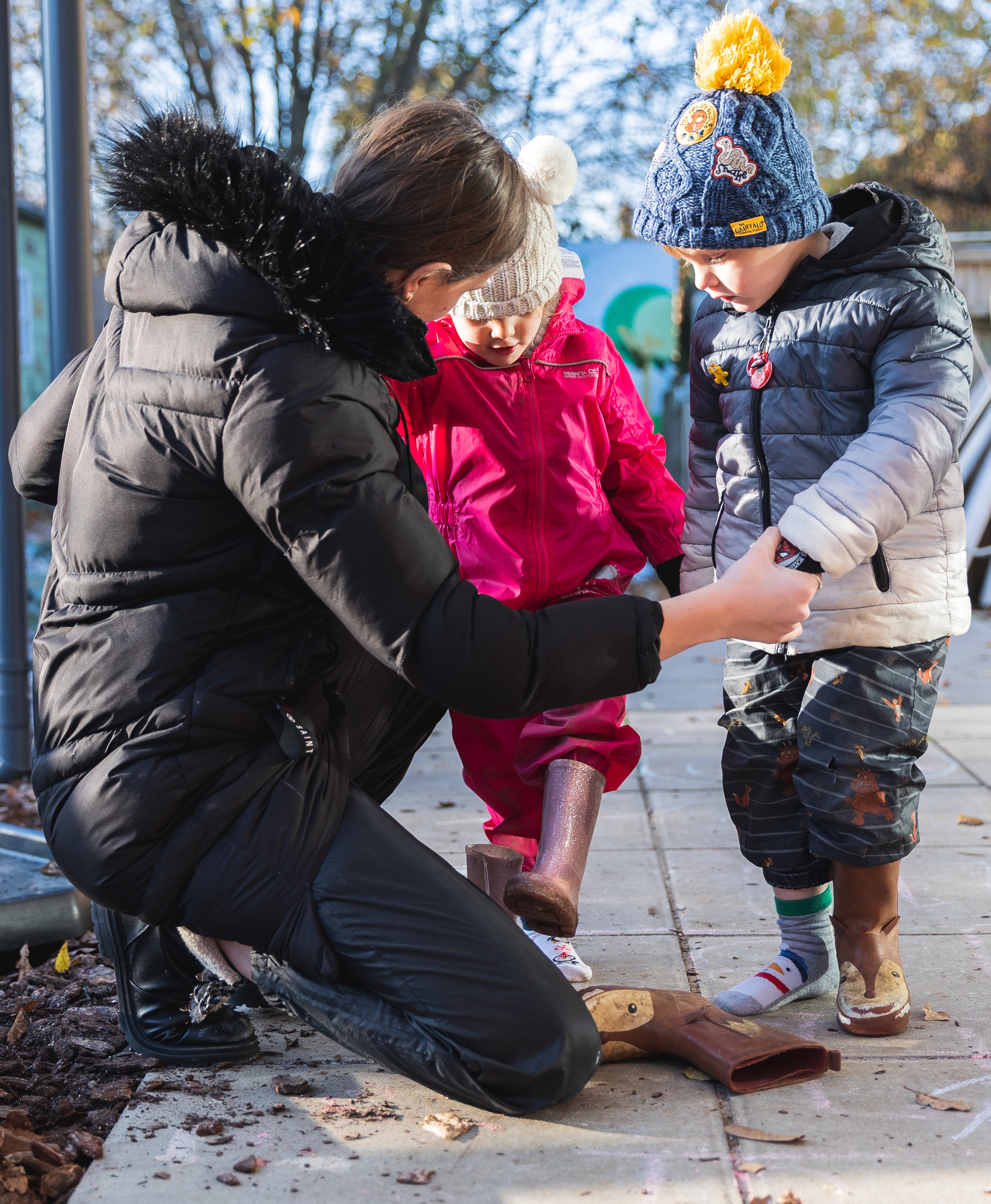
Side Quote Color:
peep progression pathway training
training aims:
Delegates will learn how to:
- deliver Peep Progression Pathway qualification units for parents/carers within your Peep sessions
- assess learner evidence and give constructive feedback
- use adult learning principles within your Peep delivery
- understand the SCQF processes and paperwork requirements.
who for:
Practitioners with relevant experience (early years, family learning, adult learning, social work, health and/or family support), who have completed our Peep Learning Together Programme Training. This course is also suited to volunteers, parents and student placements who support co-delivery of Peep groups.
feedback from delegates:
- "Brilliant, the training has left me with a really clear understanding of how the Pathway works, and the different levels that parents can do."
- "It was really helpful exploring the portfolio, becoming familiar with what they look like, and going through examples of answers. It was also good talking to others in breakout rooms to figure out what we might do."
Join a free Pathway Information Session for practitioners and managers
to find out more about using the Peep Progression Pathway with your local families
Mon 2 December: 3.30 - 4.30pm - click here to sign up and get your Teams link
> Please note: Before attending training your organisation will need to go through the process of setting up as a Delivery Centre, if there isn't one in your area - find out more about becoming a delivery centre or attend our next Pathway info session.
How to book training:
> Check course dates then complete and return the Peep Progression Pathway Training Booking Form
> Or find out about arranging your own in-house training
Duration: 1-day (9.30 - 3.30pm)
Training price: £160 + vat pp, including online access to Peep Progression Pathway delivery and assessment resources.
Online platform: Microsoft Teams (let us know if you can only use another platform). Delegates should each have a laptop/ computer (or tablet) to use, at home or at work; if this is a problem please let us know in advance.
Please book and send delegate details at least 10 working days before the course.
Find out more about:
> Peep Progression Pathway parent qualification units
> How you could deliver the Peep Progression Pathway units in your area
Payment and Cancellation Terms and Conditions: Peep Learning Ltd, the trading arm of Peeple, will invoice you after receiving this booking form. Payment is due within 30 days of invoice date. Fees are only refundable if cancelled more than two weeks before the course. (Peep Learning Ltd Vat Registration no: 768 4173 94)
Contact us with any questions: pathway@peeple.org.uk
peep progression pathway training
to offer parent qualification units in your Peep groups
Feature box colour:
find out more or book training
tel 01865 397 970
training@peeple.org.uk
> dates & booking
> in-house training
> training courses
> sign up to our e-newsletter
Side Quote Color:
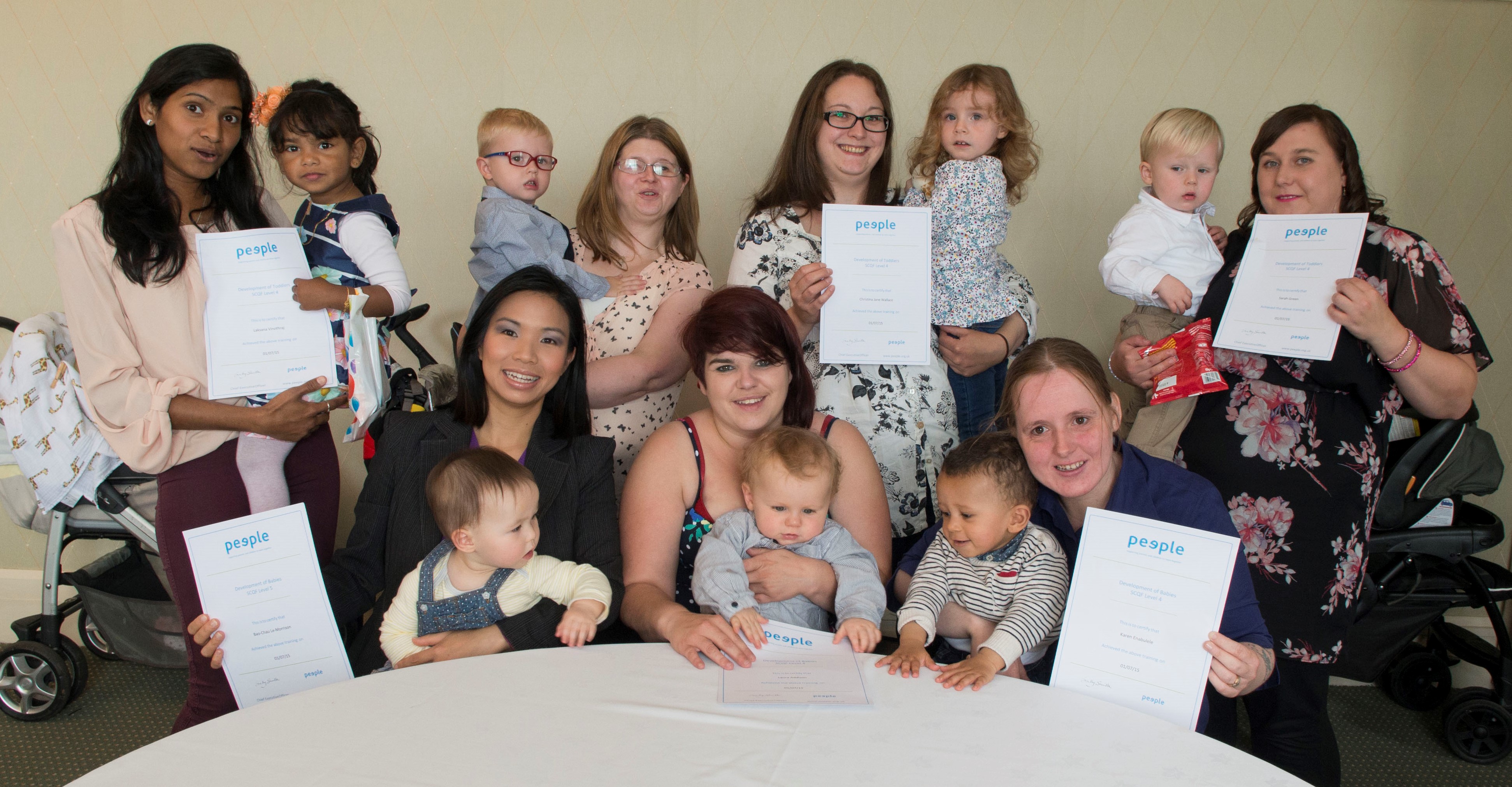
Maths in everyday routines
Everyday routines and activities are full of maths! They include lots of opportunities for your baby or child to explore numbers, counting, space, shapes, patterns, sorting and matching.
The conversations that you have with your child at these times are often rich in maths language – these will help your child to understand maths ideas as well as the words used to describe them.
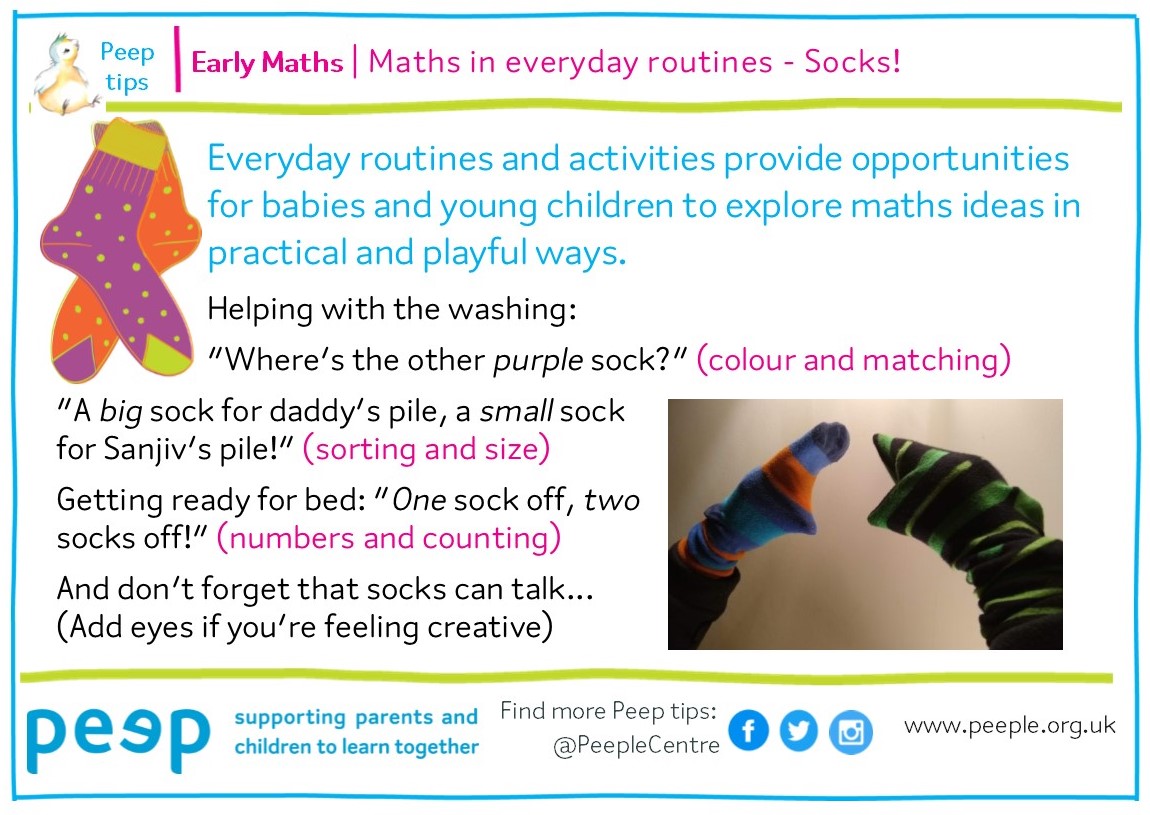
Feature box colour:
Side Quote Color:
News: Bicycling for Dolly's Books
Rod's Bicycling for Books campaign to get books into the hands of children is complete!
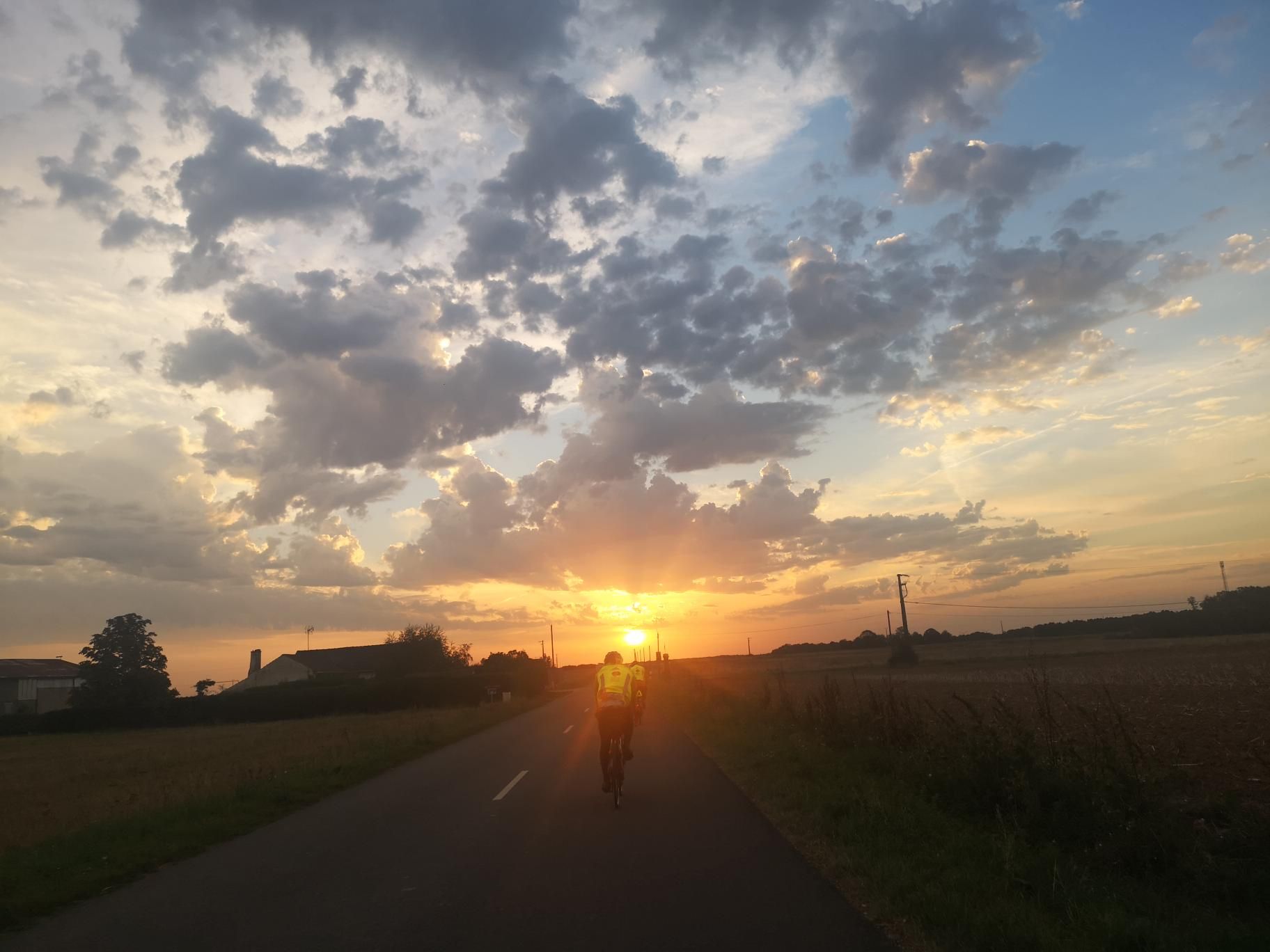 745 miles in 90 hours to raise funds for Oxford’s Peep Imagination Library - he did it!
745 miles in 90 hours to raise funds for Oxford’s Peep Imagination Library - he did it!
We are delighted to announce that Rod completed his epic 1200km fund-raising bike ride from Paris – Brest – Paris within the allotted 90 hours raising over £6,000 in the process, including gift matching from Invesco! The oldest endurance race in the world, PBP attracts a worldwide line up of amateur cyclists who all want to push themselves mentally and physically. Dehydration, hallucinations, debilitating fatigue, injury and sleeping on the roadside next to strangers – all rites of passage of the PBP - we can see why Rod signed up!
Those who have been lucky enough to meet Rod will comment on his unflinching positivity, can-do attitude and bellowing, infectious laugh but we must applaud his mental strength the most. The physical toll of the qualification rides themselves would have been enough for most to be wishing for the back seat of a tandem, but Rod was quietly racking up the miles in his legs on his recumbent bike and powering through back problems and viruses.
Not only did he make it to the start line, he did so after contending with a broken saddle on arrival in France. Undeterred, he set off with 6431 international riders for the race of a lifetime. His twitter updates illustrated the mental and physical pain that he was going through, but he persevered and finished within the allotted time!
What was Rods motivation? “For some parents who perhaps have to choose between heating or eating, or are simply just finding it hard to spend enough time with their young children, books can provide that magical moment - a shared space with just you and your child - that can make all the difference. Some of my best memories from when my own kids were young have been the stories we shared at bedtime or in the car. Peeple are providing the books and the support to help create those moments, and to help fire children's imaginations.”
All the money raised by Rod’s efforts will fund books for the Peep Dolly Parton Imagination Library, which gives books to children in the Leys, Littlemore, Rosehill and Berinsfield areas of Oxfordshire.
Our favourite tweet from Rod during his cycle: “What am I doing? I've had approx 5 hrs sleep in the last four days. I'm sweaty and dirty and tired. My limbs are screaming at me to stop. The best decision would be to book in to a hotel, wash and sleep, but I'm not making good decisions.”
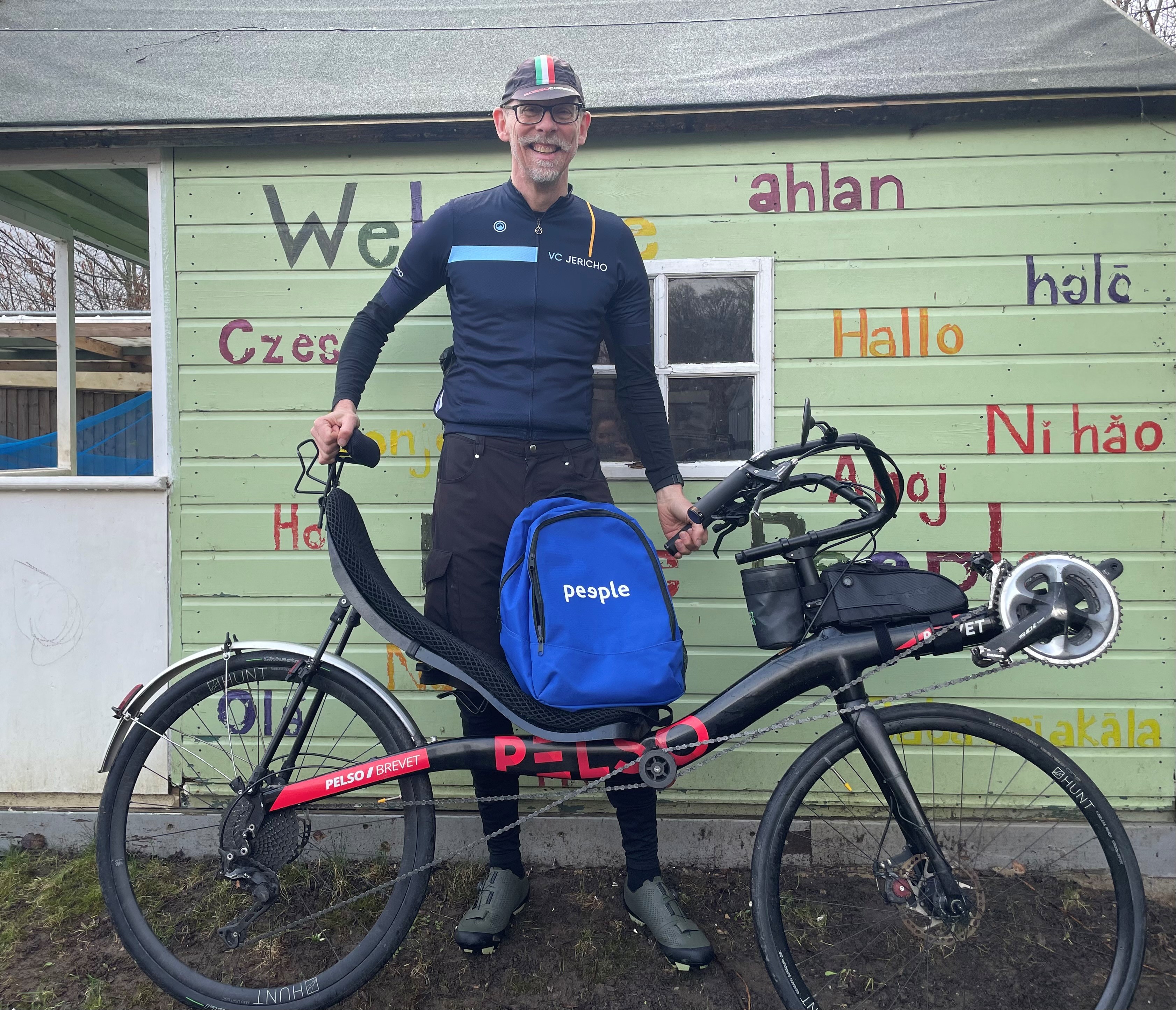
Rod, we are so grateful for your ‘bad’ decision. Thank you from us, and all the recipients of the Dolly’s Imagination Library books that you – and all your generous supporters and donors - have funded. We, and the Little Peeple Nursery peloton, can’t wait to welcome you back for a victory lap with us in Littlemore.
For further information or to talk about a fundraising idea, please contact support@peeple.org.uk.
Thank you to everybody who has donated to fund more books for more children via Peep’s Imagination Library. Please continue to spread the word to friends, family and colleagues.
Feature box colour:
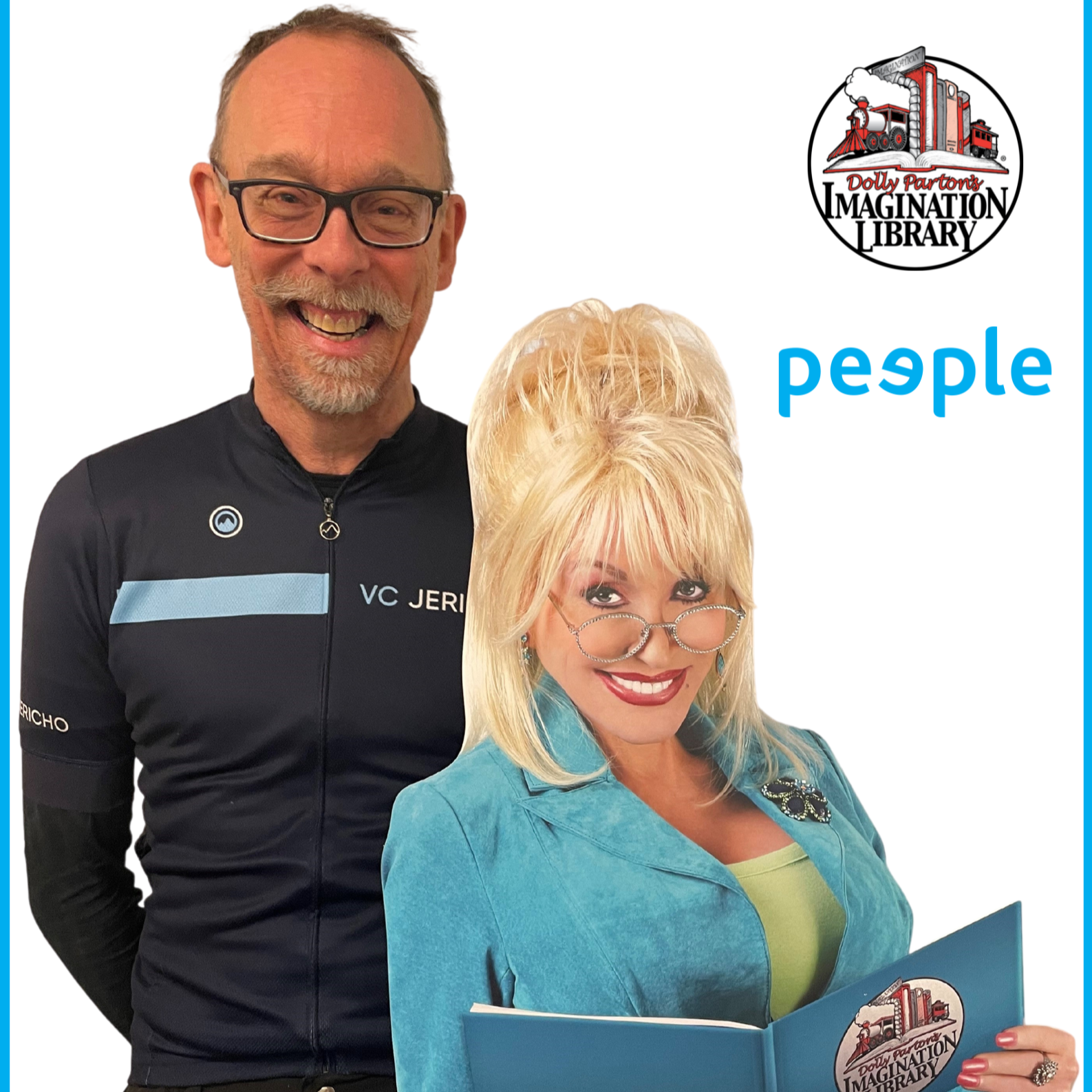
> You can donate via text: Text B4B followed by your donation amount to 70085 (e.g. B4B10 for a £10 donation).
Having books at home makes a real difference to babies' and children’s love of stories and books. This gives them a flying start in learning to talk and read, and extends their language - children's vocabulary at age five is the biggest predictor of how well they do later in life.
> Read more about the Peep Dolly Parton Imagination Library, which has gifted over 50,000 books to children in Oxfordshire since 2014.
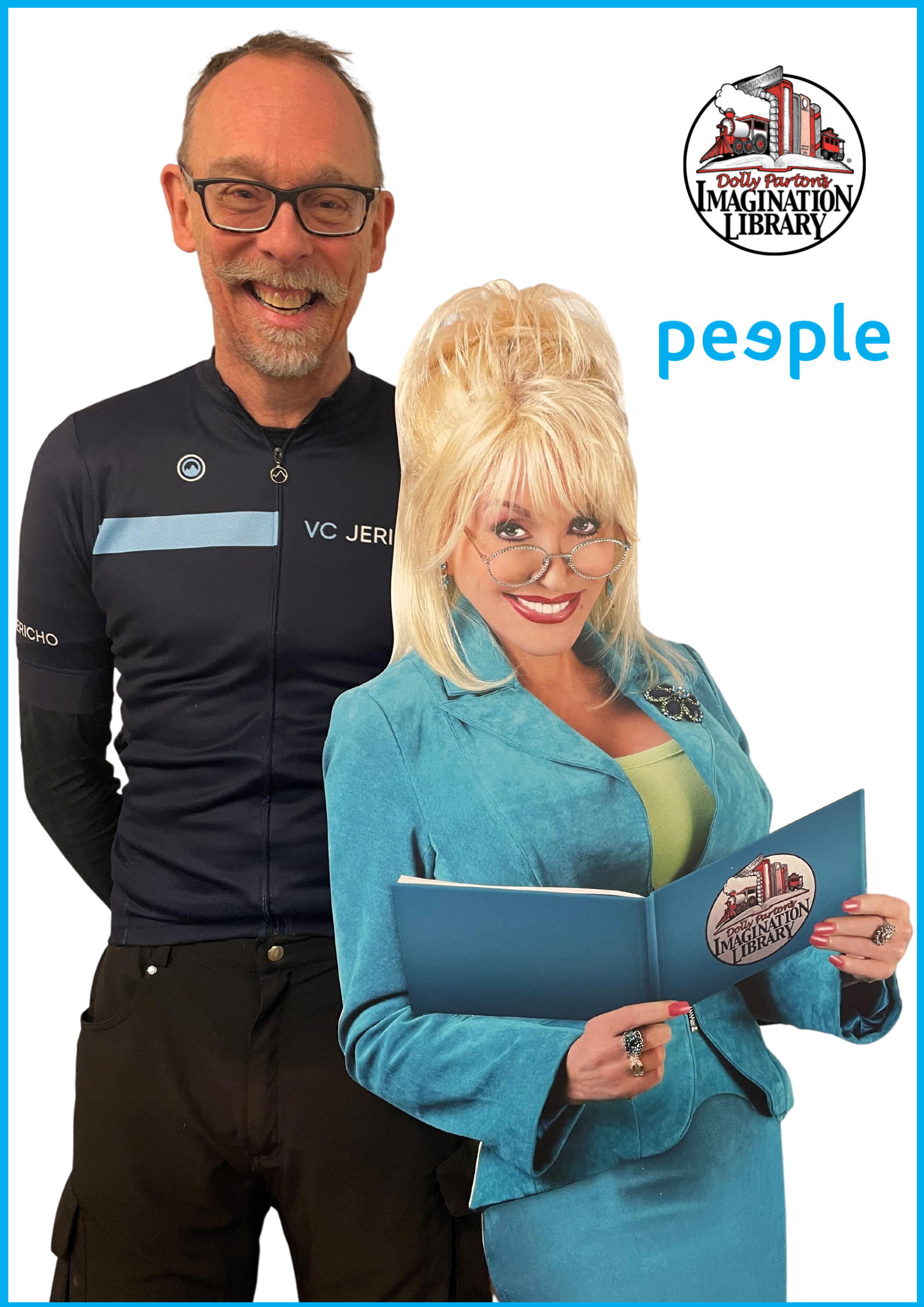
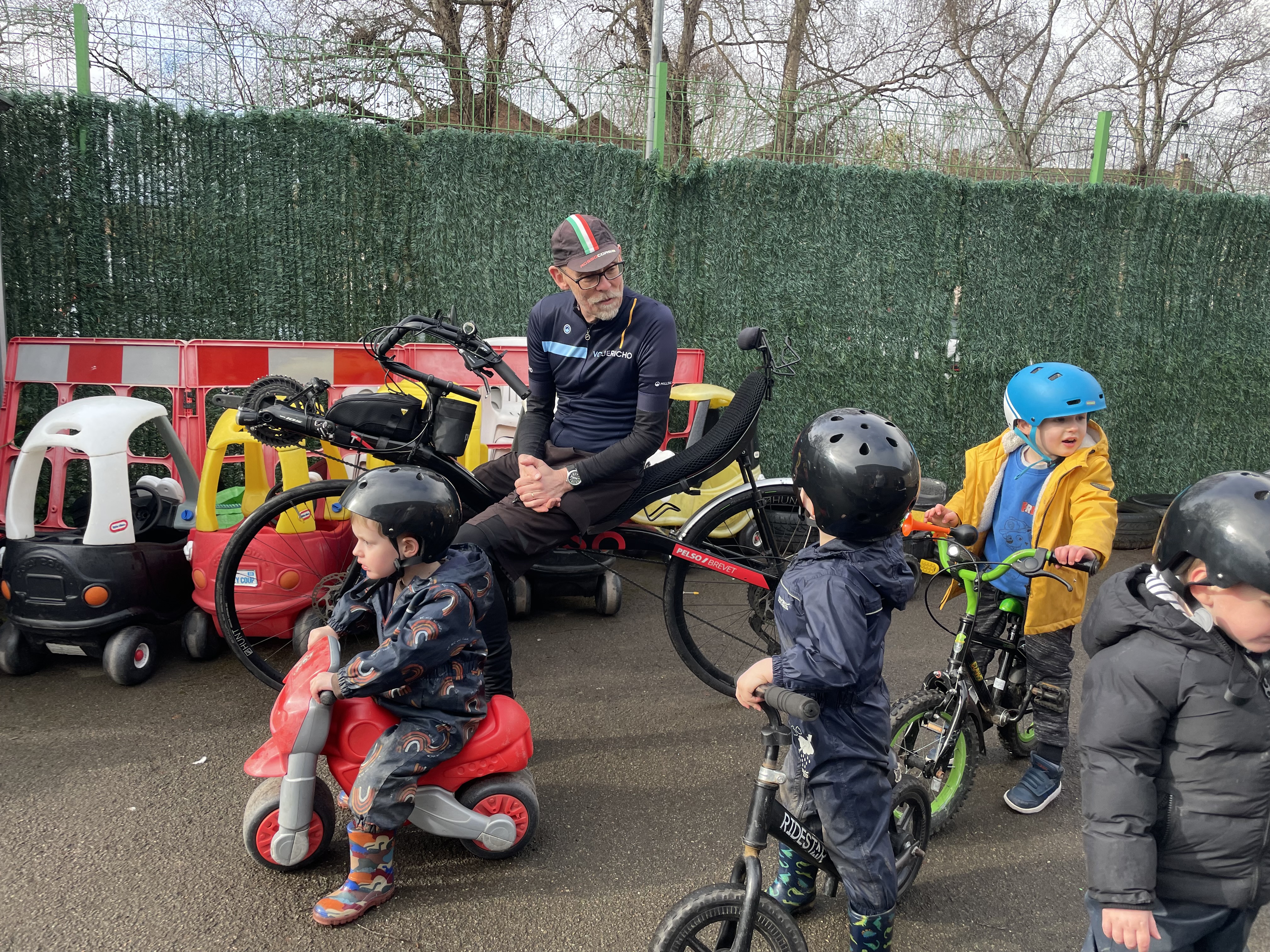
Side Quote Color:
Intergenerational Peep: Aberdeen
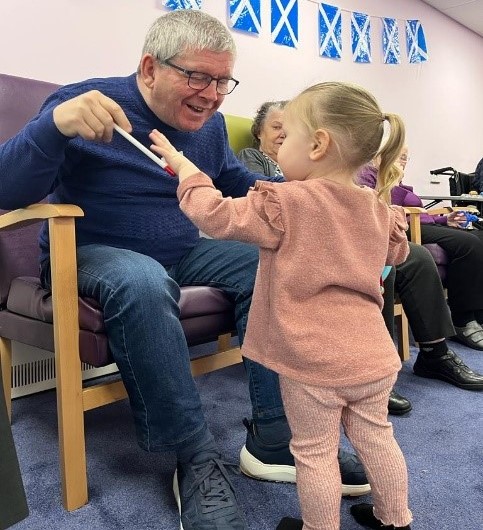 Intergenerational Peep in a day centre or care home for older people is like a typical Peep group but with icing on top – all the usual fun and learning benefits for children, parents, carers and practitioners, but with an extra layer of local older participants. Here’s an insight from Peep practitioners in Aberdeen:
Intergenerational Peep in a day centre or care home for older people is like a typical Peep group but with icing on top – all the usual fun and learning benefits for children, parents, carers and practitioners, but with an extra layer of local older participants. Here’s an insight from Peep practitioners in Aberdeen:
"Peep Aberdeen recognised the opportunity of coming together with the older adults in our communities and the benefits intergeneration Peep could have for the participants. We partnered up with Bon-Accord Care to create an age inclusive Peep group whereby toddlers and older adults alike can make social connections to enhance their well‑being and self-confidence.
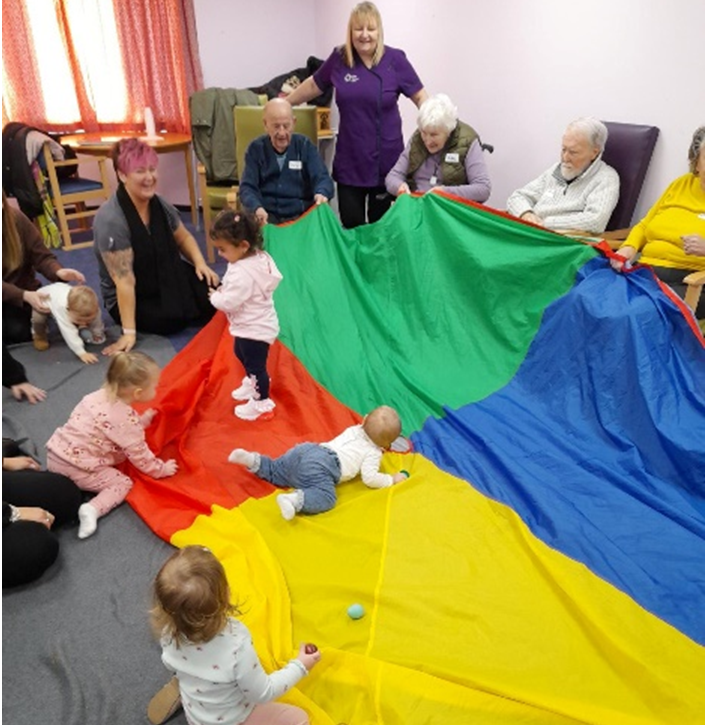 The group has been running with great success for the past six weeks. Over this time we have explored a range of topics from our Peep Learning Together programme including Musical interactions and Balance and co-ordination. We celebrated Valentine’s Day and Burns Night with some crafts which everyone enjoyed. Most recently we practised our balance and co-ordination, walking along the balance beam and throwing beanbags into the box. Both children and adults showed fantastic support and encouragement to one another during the activities.
The group has been running with great success for the past six weeks. Over this time we have explored a range of topics from our Peep Learning Together programme including Musical interactions and Balance and co-ordination. We celebrated Valentine’s Day and Burns Night with some crafts which everyone enjoyed. Most recently we practised our balance and co-ordination, walking along the balance beam and throwing beanbags into the box. Both children and adults showed fantastic support and encouragement to one another during the activities.
During each session we share lots of songs, including classic nursery rhymes our older adults remember from their own childhood.
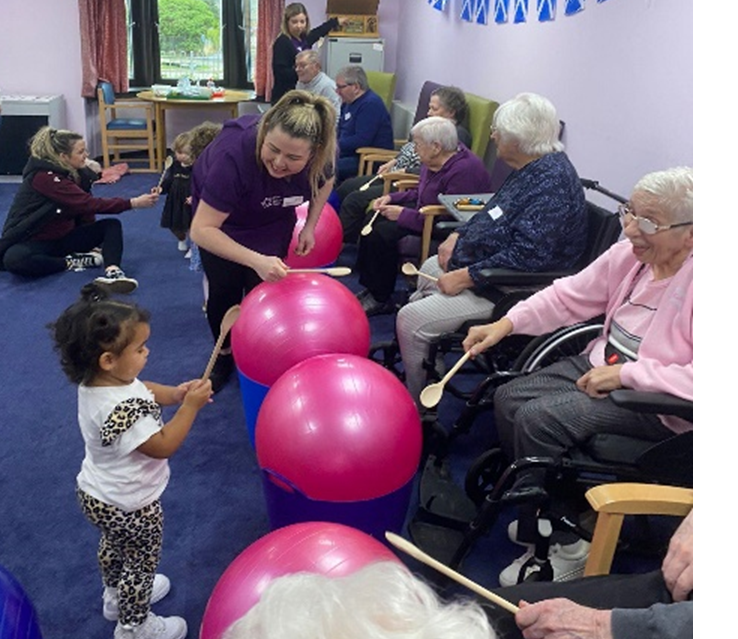 Following our busy activities, we gather around and listen to a story, which one of our older friends enjoys reading to everyone."
Following our busy activities, we gather around and listen to a story, which one of our older friends enjoys reading to everyone."
'Love the group, it's great for the community' - parent
'I have had a great day, I am so happy to see the children' - older adult
'So nice to see children interacting with the older generation' - parent
'Coming together singing familiar songs is my favourite bit' - older adult
'We adore our intergenerational Peep group! It's by far our favourite group of the week. My daughter is very sociable but she has come on leaps and bounds since attending Peep. She gets to play and chat with her friends and so do us mums, it's just great. I enjoy my cup of tea with the residents after the class and it feels like I’m having a catch up with friends. We would come everyday if we could.' - parent
“Intergenerational practice is inclusive, building on the positive resources that the younger and older persons have to offer to each other and those around them.”
Beth Johnson Foundation (a charity dedicated to making the UK age-friendly)
Feature box colour:
Infographic: thanks to Global Intergenerational Week Ireland (www.giwireland.com)
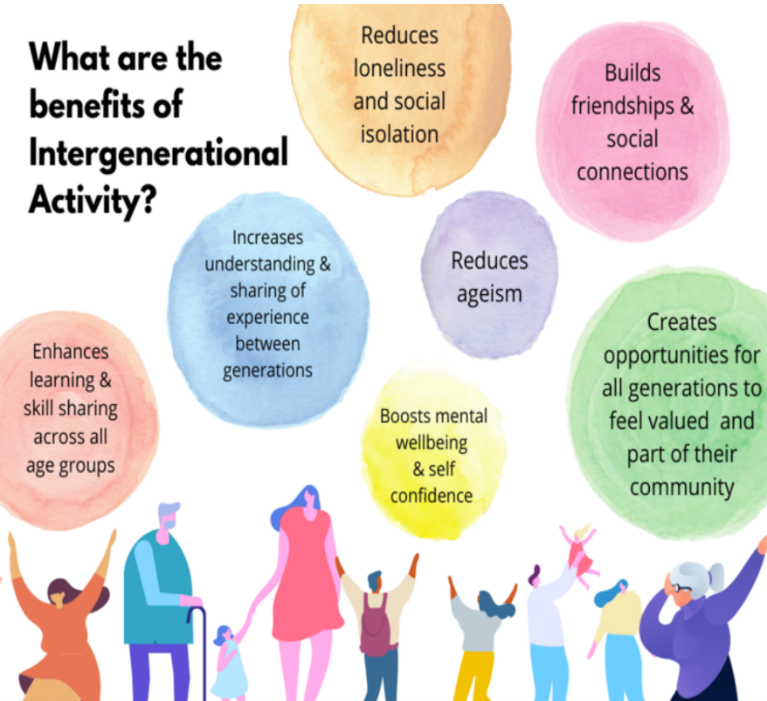
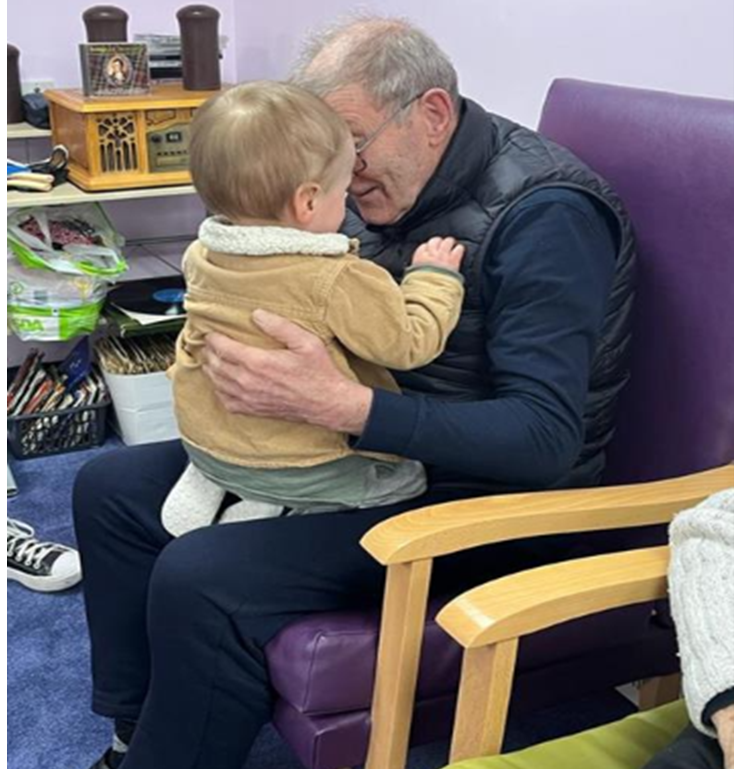
Side Quote Color:
how to share Peep handouts with families
Peep Tips and Things To Do at Home (TDAH) handouts:
You're welcome to share the Peep Tips and Things to do at home (TDAH) activity ideas online or to print them. We continue to add more to the topic toolboxes and TDAH webpage (log-in area) - as PDFs (for printing) and images (JPEGs or PNGs for sharing online).
We often share Peep Tips or TDAHs on our Facebook, Instagram and Twitter/ X pages (all @PeepleCentre) and in the public Parents Area on the website. You're welcome to share posts or encourage parents and carers to follow us - our social media pages are for practitioners and families. You can also share Peep Tips and TDAHs directly on your own social media pages if you prefer - you're welcome to tag us, we love to see what's happening with Peep in different places!
LTP Topic Handouts:
If you want to share a Peep LTP Topic Handout online (the 4-page A5 folded leaflets sharing the topic content with parents), please only share it with the local families you work with, e.g. via email or on a closed social media group page, Whatsapp group, or online learning journal such as Tapestry. As you know, the Programme is at the heart of our work as a charity supporting parents and carers with their children’s learning, and we really appreciate your support in protecting it in this way. It helps protect the copyright of the Peep Learning Together Programme.
Peep songs and Peep the Parrot storybook: find out more about copyright and sharing here.
If you have any questions or suggestions for more tips or handouts, please drop us a line: support@peeple.org.uk
Feature box colour:
Side Quote Color:
help us spread the word about Peep
We are making some short videos to share online with those who are new to Peep sessions and the charity Peeple - parents/carers and people working with families. We’d love to include some short clips from parents and professionals who are already familiar with Peep - saying what you like about it, and what difference Peep has made to you and your family or the families you work with. Seeing ‘real’ people talking about Peep helps bring it to life more than a leaflet can!
If you’d like to record and send us your thoughts on Peep, please do the following:
- Click the link to read and complete the Consent form
- Record a video on a phone – it could be recorded by you or a friend or practitioner, at home, at work, or before/after your Peep session. See below for some Tips for filming on a phone and click this link to see a clip from a Peep parent as an example.
- Share your video with us on our private and secure Dropbox account - please click here to access the Peeple Dropbox folder, which will prompt you to upload your video from your device. Dropbox will also ask you for your name and email address – please add your locality after your name (e.g. Jo Bloggs – Edinburgh), so that we can match up videos to consent forms. (Within Dropbox, your video and your name and email address will only be visible to the Peeple video-making team.)
Tips for filming about Peep on your phone (or download the Tips)
- Keep the phone steady by balancing or propping it up on something.
- Make sure there is nothing in the background that you wouldn't want on film, especially personal information.
- Be well lit from the front, natural light is best.
- Try to keep your head and shoulders in shot, ideally landscape view (phone sideways).
- Have an idea of what you are going to say about the impact Peep has had (it doesn't have to be scripted).
- Remember to introduce yourself, including your role, e.g. Parent with toddler, or Outreach worker using Peep in Stay and Play, etc
- Hit record and go - it's great if you start with a smile and look at the camera

Thanks for your time - do get in touch if anything isn't clear or you have any questions: support@peeple.org.uk or tel 01865 397976.
Feature box colour:
Side Quote Color:
how peep supports the home learning environment
The evidence-based Peep Learning Together Programme supports practitioners and parents* with young children’s development and learning, making the most of their earliest years and helping to improve later outcomes. It is widely used across the family support and early years sectors, including Family Hubs. Find out below how our Peep programmes support children's outcomes through a strengths-based approach to working with families, supporting staff development, and providing comprehensive and flexible resources that can be used in universal and targeted delivery.
Peep sessions raise parents’ confidence and awareness about:
- the value of their role and their relationship with their child,
- the simple things they can do in day-to-day life to support learning, and why these things make a difference.
There is compelling evidence that these two interconnected things, sometimes known as the Home Learning Environment (HLE), are fundamental to a good start in life. The human brain is built not born – the 100 billion brain cells that we are born with need to be connected up. Most of these connections are made during the first months and years of life, and are heavily influenced by the child’s relationships and experiences during this period. It's never too late to make a difference but it makes sense to get involved as early as possible. Increasing parents’ understanding contributes to preventative early intervention or more targeted later intervention, helping to narrow the attainment gap in society that is already apparent before children start school.
'The Peep course has really helped my family to bond. We play together much more often.' Peep parent
The Learning Together Programme is comprehensive, with five strands of learning which complement the EYFS (Early Years Foundation Stage) and other early years frameworks: Personal, Social and Emotional Development, Communication and Language, Early Literacy, Early Maths, and Health and Physical Development. Practitioners who attend the 2-day Peep Learning Together Training are given online access to 74 child development topics (each with downloadable session plans and parent handouts), along with extensive implementation support.
Evidence-base:
Peep programmes have been evaluated in a number of independent research studies by the Universities of Oxford, Queen's Belfast and Warwick. These show that Peep:
- helps children develop strong foundations for language, literacy and self-esteem – improving outcomes for all, but with the greatest impact on the most disadvantaged
- successfully reaches families and engages them in their children’s learning
- helps parents become more aware of their children’s development and how to foster it
- enables practitioners from a wide range of professions develop new skills and fresh approaches to unlock parents’ potential, rather than focus on their problems.
'Since I started Peep I talk more with my daughter about what is in the book we are looking at – not just the words. We sing loads and I am beginning to feel more confident with messy play.' Peep parent
The evidence-based Learning Together Programme (LTP) was developed for practitioners to use with parents and their children from birth to school. Increasing parents’ understanding contributes to preventative early intervention or more targeted later intervention, helping to narrow the attainment gap in society that is already apparent before children start school.
'Peep provides a very clear structure to provide key messages and support around learning in the home to parent/carers. The programme content and resources are very comprehensive and of a high standard, and can be delivered flexibly. The training was fun and interesting, with very engaging and experienced trainers. I feel really motivated to start delivering Peep in our locality, along with Family Hub colleagues across Hull.' Catherine, Early Help Team Manager, Hull City Council Family Hub
How the Peep Learning Together Programme is used with families to support children’s outcomes:
Valuing and building on what parents already do:
Peep is a strengths-based approach to working with families. Key child development ideas are discussed during Peep sessions, including how the ideas relate to families’ experiences. Children’s behaviour, for instance, can become easier for parents to manage or re-focus when they understand a bit more about possible causes. The topic on schemas can provide alternative activities for a child who is exploring throwing things, while ‘Mark making’ helps explain why a child might be swirling their food on the table, and suggests other ideas for making marks (sand, mud, playdough, paintbrush and water on the ground, etc). The combination of information with practical ideas helps restore parents’ own patience whilst providing their child with more opportunities to develop their skills through play.
Peep sessions also include songs and story time, and simple, low-cost play and talk activities that can be continued at home. When parents understand more about the benefits of singing, talking, playing and sharing books and stories with their baby or child, and share simple ideas for incorporating them into everyday life, they tend to do more of these valuable activities.
'Peep was very informative and interactive. It has made me more comfortable and confident as a parent. More importantly, I now understand my kids better than before being involved in the sessions.' Peep parent
Delivery format:
The Peep Learning Together Programme was designed to be used flexibly, to suit the needs and interests of all families. Peep sessions can be delivered in groups, in drop-in sessions (e.g. Stay and Plays or child health clinic waiting areas), or in the home or other one-to-one sessions. They can take place indoors, outdoors or online. Peep practitioners (two co-facilitators or a session leader and assistant) decide on the number of sessions in a Peep course, and which of the child development topics to focus on, involving parents' preferences as appropriate.
'Peep was very good. Learnt a lot about the importance of praise and positive feedback, my impact, body language, etc.' Peep parent
Strengthening relationships:
The Peeple principle that ‘relationships are at the heart of learning’ underpins both the practitioner training and Peep sessions with families. Several of the Programme topics focus specifically on supportive and loving parent-child relationships, but nurturing and reflective care underlies all Peep sessions. Practitioners use the ORIM framework to identify Opportunities, Recognition, Interactions and Modelling that parents are doing with their children, building their knowledge and confidence, and helping to strengthen their relationships. Parents are encouraged to share ideas and activities from the session with other family members at home.
In feedback, parents often comment on how much they appreciated the friendships and peer‑to-peer support networks that they and their children develop:
'The discussions within the session – it is never rushed or brushed past. Honest conversations with other parents made me feel better on days where I’ve wondered if it was just me feeling a certain way. The staff are very welcoming and put you at ease.' Peep parent
Universal delivery and accessibility:
In our experience, families from all walks of life benefit from getting to know other families and practitioners, sharing practical ideas and experiences with each other, and finding out about other local services. Being seen to be open to all families can reduce the stigma that is sometimes associated with ‘parenting’ groups. The focus in Peep sessions is on supporting children’s learning and development, which also helps with parents’ sensitivity. As a society we're gradually recognising that groups for parents and children are beneficial for all families. Cross-sector support such as that provided by Family Hubs can really help break down barriers.
Targeted delivery:
Peep programmes can be used or adapted for families with similar needs or circumstances if helpful, such as young parents, dads, foster carers or kinship carers, children due to start nursery or school (transition or school readiness), families with English as an additional language (EAL), parents with post‑natal depression or anxiety, children with delayed speech and language, families with a parent in prison, traveller families, childminders, or families whose children have additional support needs (SEND), etc. While some parents prefer to go to a group that is open to all, others would rather start off with parents that they feel they have more in common with.
Course content can be targeted by age/ developmental stage and/or one or more of the five strands of development. Some Peep practitioners have added in elements that appeal to the families they are working with, such as Peep in the Pool, Cooking Peep or Outdoor Peep. Peep programmes can also be used to complement or follow on from other provision, such as Baby Massage or Peep Antenatal courses, or transition sessions into early years settings.
'Because of Peep I am always looking for opportunities to help my child learn and get new experiences.' Peep parent
Sharing ideas with families beyond direct delivery:
We post Peep activity ideas and tips that support the home learning environment on our Peeple social media platforms (Twitter, Facebook and Instagram, all @PeepleCentre). These are used by parents and practitioners. Peep practitioners can also share Peep handouts on their own social media pages or online groups (e.g. via Whatsapp), as well as printing them.
Quality Assurance and workforce development:
Peep programmes and delivery are quality assured by:
- our evidence-base, findings from wider research, and our delivery model, described in our theory of change,
- our regularly monitored and reviewed training courses, which focus on enhancing practitioners’ theoretical and practical skills, knowledge and understanding about working with parents to support their children’s development,
- the comprehensive, high-quality Programme resources available to all trained practitioners,
- reflections from our own practitioners, and practitioners we have trained around the UK, Ireland and Australia over the past couple of decades, along with those of the families they have worked with,
- accreditation units available to both practitioners and parents,
- post-course delivery support and sharing of best practice, available to Peep practitioners and organisations, including monthly online practitioner support sessions, Peep Champions network, delivery support newsletters, practitioner Facebook group, refresher training, and Members Area on our website.
‘Peep is fantastic for involving parents in their children's learning. It gives parents more confidence to support their children's learning and take it forward at their child's pace and development level.’ Children’s Centre family support worker
Sustainability, value for money and a joined-up approach for organisations:
We have trained practitioners from numerous settings and backgrounds, such as family hubs, children's centres, nurseries, pre-schools, schools, health centres, early help, libraries, family learning, psychology, social care, public health, prisons, museums and community centres. As a charity, we have always prioritised making the training affordable and great value for organisations, providing on-going access to both the Programme materials and delivery support.
Practitioners can be employed or volunteers, including parents who have gone on to become Peep practitioners, sometimes after completing the Peep Progression Pathway accreditation. Peep delivery can be an opportunity for practitioners from different sectors to work together, sharing their complementary skills and experience with families and each other.
‘I find Peep a huge benefit to both myself and the adults that I work with. It's good fun, factual, and understanding that everyone is in the same boat and trying to be the best parents they can be, and that we can support each other.’ Early childhood practitioner, nursery class
* For readability, we use the term ‘parents’ to refer to family members and others with a key caring role.
If you're part of a Family Hub or an organisation working with families, find out more:
> Peep Learning Together Programme
> Peep Learning Together Programme 2-day Training for Practitioners
> Arrange a free Information Briefing for managers and decision-makers
> Arrange In-house Training (online or face-to-face)
> Watch our video 'How Peep Programmes can support your work with families'
Feature box colour:
find out more or book training
tel 01865 397 970
training@peeple.org.uk
> training courses
> dates & booking
> in-house training
> sign up to our e-newsletter
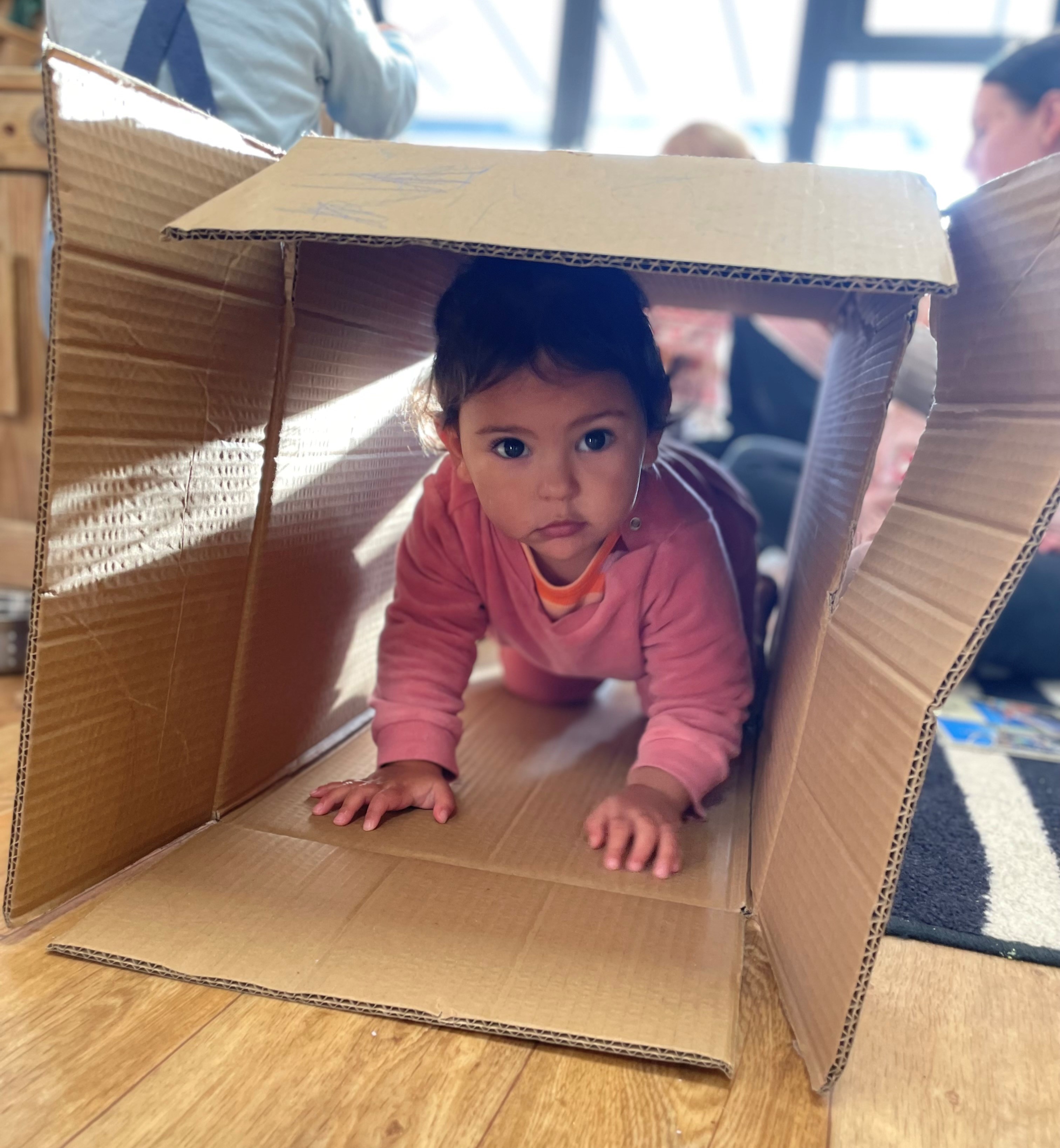
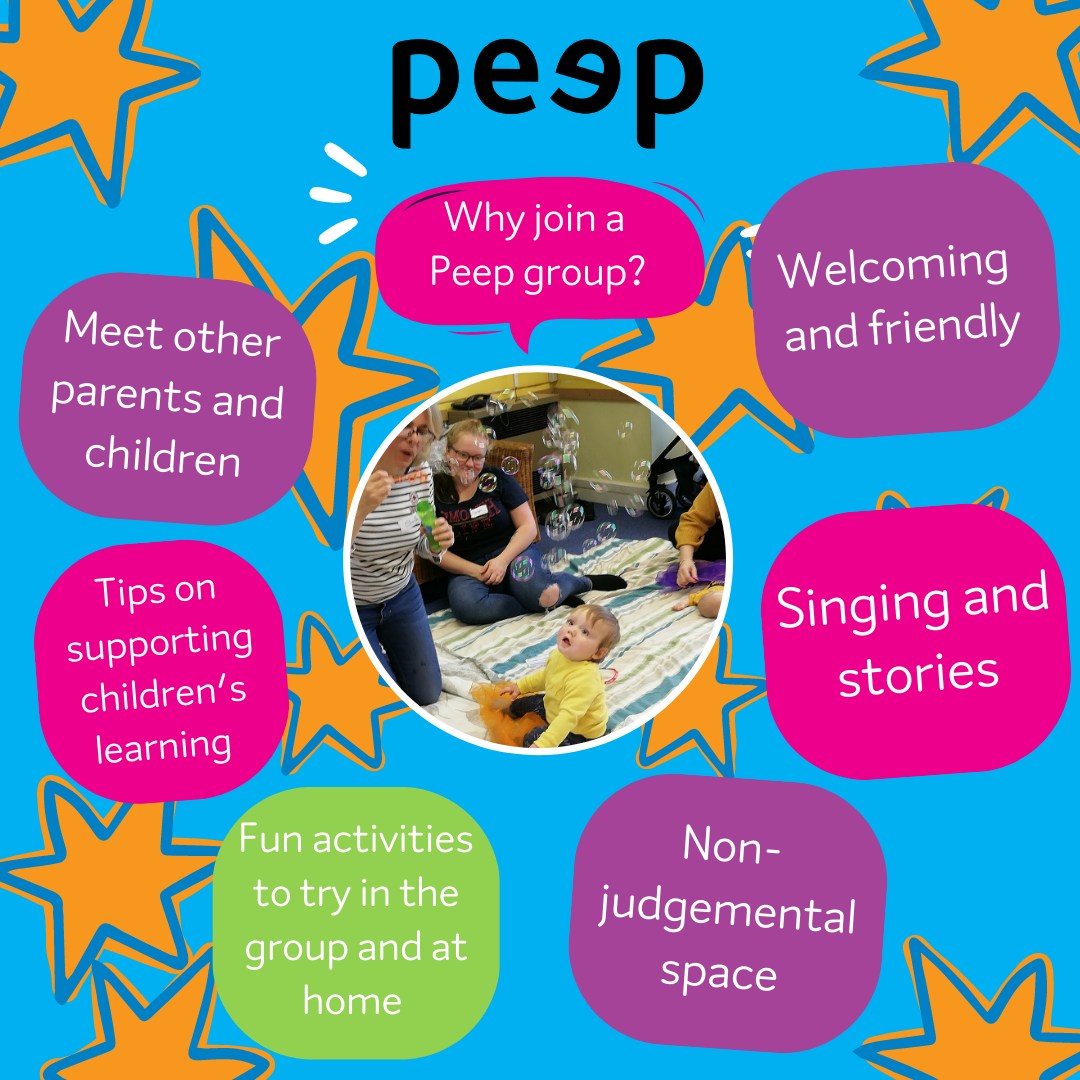
Side Quote Color:
agreeing expectations
It's a good idea to create a Group (or 1:1) Agreement with families. Discuss and add items with families, so they feel ownership of it too. Pin it to the wall each week, so you can easily refer back to it, update it as necessary, and share it with new families. There's further guidance about creating one in the Introductory session plan.
It may include:
- confidentiality of information shared within Peep sessions, including the names and personal details of parents and children
- limits of confidentiality. For example, if a parent shares that they or their child are at risk of (or are) being harmed, this information will be passed on to relevant people
- mobile phones (if allowed) on silent during sessions
- parents are fully responsible for their child/ren when they are in the session
- listening carefully to others and respecting differences of opinion and values
- respectful challenging of views or behaviours which may be hurtful or prejudiced
- starting and ending sessions on time, whilst allowing group members to join in if delayed
- for home or one-to-one delivery: notifying practitioners about who will be present and any pets on the premises.
If the above are not suggested, it’s a good idea to raise them. Agreeing expectations is essential and helps practitioners and parents to feel comfortable during Peep sessions. It will set the tone for them and will often moderate unhelpful behaviours before they become challenging.
Adaptable examples below:
> Group Agreement: face-to-face sessions

